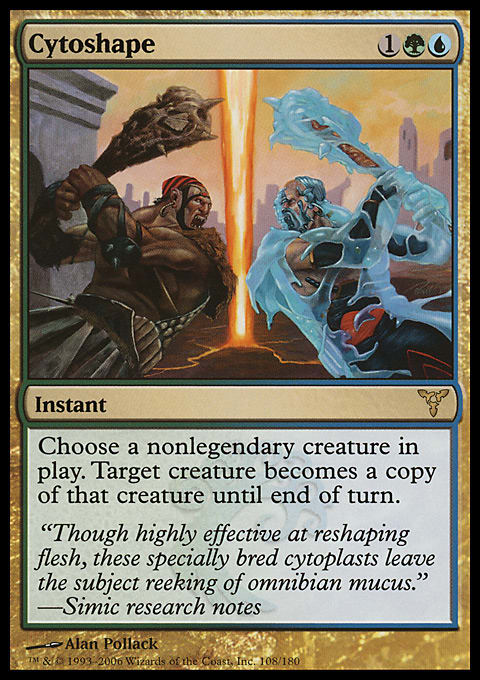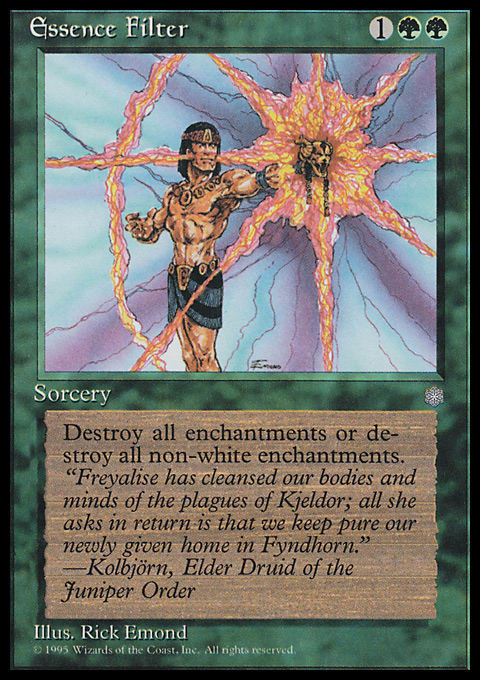Rituals are everywhere. In a given year, each of us goes through many major rituals. Some of them are shared by people in your broader culture; mine include Halloween and the Fourth of July. Some are specific to your social group, such as birthdays and weddings. All of them have certain expectations attached if you’re going to “do them right.”
At the same time, we have the smaller rituals. Again, some are more universal, such as the procedures for greeting people. Some are more particular, such as meeting a friend at a particular time and restaurant each week. Again, these are activities with certain expectations attached.
Likewise, there are rituals in the Magic community, both universal and personal. And this weekend, we are heading into one of the biggest and most consistent rituals of all: the prerelease weekend.
But why do we have prereleases? Why do we have big events like the Pro Tour or weekly events like Friday Night Magic? They’re community builders. They get people excited. But how?
The Birth of a Ritual
To start with, let’s look at smaller rituals. Although many of our major Magic rituals were meticulously planned, the smaller ones are often based in spontaneous actions that stuck (Driver 17).
After introducing Magic at the psych hospital where I am in training, I soon heard that more experienced players were teaching newcomers to play. When it came time for me to create an official Magic group, I simply took what was already happening and supported it. I set up a regular time for people who wanted to teach and people who wanted to learn to get together, I provided simplified decks for the learners, and I acknowledged the teachers’ contributions by bringing them more complex and exciting cards.
The group has been quite successful, and I can claim very little credit—it grew directly out of the residents’ desire to share the game. Something happened, it was meaningful to people, and it became repeated and formalized. A ritual was created.
While it’s easy to see how the teaching ritual is meaningful, some tend to be more opaque. When I was in college, our gaming-centered dorm suite (dubbed Geek Tower—we even had a poster in the stairwell) had a silly tradition. Whenever someone said, “Birds of Paradise,” anybody else within earshot would quizzically say “Birds of Paradise?” We would actually come out into the hall to join in or yell it out the door. How did this come about? Honestly, I don’t have any idea. I saw other people doing it, it was harmless fun, and it was clearly a “Geek Tower thing,” so I joined in.
Pointless imitation as a social action is powerfully ingrained in most people, from small children (Kenward 11) to adults (McGuigen, Makinson & Whiten 1). These authors and many others found that when people are shown how to use a tool, they copy even the parts of the action that they can clearly see are unnecessary. Likewise, aspects of our tournaments may not seem necessary, but they’re still important. The seemingly inefficient actions serve a purpose—but that purpose is social, not practical.
Ritual as Unification
“Groups affirm their identities through practices that ‘ritualize’ the routines of their communal life” (Hermanowicz & Morgan 198). This is from a sociology article called “Ritualizing the Routine: Collecive Identity Affirmation.” Each of us has any number of different identities—I am a psychology student, a woman, and a judge. Each of these might lead me to live my life differently than someone who does not have that identity. Each will even cause me to interact with the Magic community differently.
But when we come together to play, we’re celebrating our “communal life”—the aspects of our lives that we do share. And when it’s a major synchronized event like a prerelease, we are not only sharing this communal life with the other people at the event. Between matches at a prerelease, I’m on GChat and Twitter, trading first impressions and dramatic plays, connecting with friends and strangers around the world.
Grand Prix and Pro Tour events are also important rituals in the Magic community. Although I’m not playing alongside the participants, I’m kept up to date by those who are. Twitter has turned me into an audience member from hundreds or thousands of miles away.
By participating in these rituals, whether as a player or as an audience member (or sometimes as a judge), we bond with the other community members and internalize the group values (Rossano 2).
In addition, you can’t have insiders without an outside. To have a collective identity is not only to identify with others in the group, but to distinguish yourself from people outside the group. How often do you think about the fact that you’re human? Rituals elevate our actions beyond individual quirks—they make us visible to outsiders and stake our claim to our existence as a group (Hermanowicz & Morgan 199).
Ritual as Definition
At the same time, rituals can be used to draw distinctions within the group. Let me tell you about two events I attended:
Clearly, there is a distinct contrast between these events. Yet they are both, at their core, a group of people getting together to play Magic. So, why do they feel so different?
The prerelease and the PTQ are two of the major rituals that help make up Magic culture. As an article in the academic journal Counseling and Values says, ritual “is more than a repetitive behavior pattern. It is logocentric, or meaning creating” (Parker & Horton 3). But what meaning is it that each of these events creates? And how, exactly, is it created?
Magic is a game that is fun, and it’s also one that is competitive. At any tournament (we hope), both of these elements are present. They certainly were at the ones I described. But it’s clear which of the above scenarios the “fun” event is and which one the “competitive” event is. Different aspects of the game are illuminated through different rituals.
Major ritual events, such as PTQs and prereleases, are comprised of a number of smaller rituals (Rossano 4). Some of these are prescribed by Wizards of the Coast, and they help to establish a consistent meaning for a given type of event. For example, this weekend, we know we’ll be playing with Avacyn Restored packs and be playing at Regular rules enforcement level because prereleases are relaxed celebrations of the new set. And PTQ players know they’re going to turn in decklists and cut to the Top 8 because the emphasis of the PTQ is on fair competition and individual achievement.
But at the same time, tournament organizers put their own personal spins on events. One major way they can do this is by introducing their own rituals. Neither the sacred rectangle of chairs nor the flying booster packs are necessary components of the tournament. Instead, they reinforce a particular meaning for that event.
Ritual as Stability
Ultimately, each of us comes to an event looking to fill a need—or many needs. Some of us are looking to have fun and see our friends. Some of us are reaching for the Pro Tour invite or just hoping for the prestige of a Top 8 finish. What kind of meaning you’re looking for will determine what kind of event you choose to go to and what kind of rituals you will seek out. But there is one thing that ritual always provides, regardless of context: consistency.
In his book “The Magic of Ritual,” Theology and Culture professor Tom F. Driver describes attending a Japanese Shinto ceremony. He recalls it fondly, saying, “At Izumo I, a stranger with no deep knowledge of the religion or the customs and totally unable to understand the language, felt at home. There the world has been put together with simple ritual and with grace. The limits are very clear—so clear that even a stranger can be told without words what to do” (Driver 38).
Although it may seem mundane, the pregame procedure is also a ritual of sorts. By following his opponent’s lead, a new player can feel secure that he is doing the right thing even if he barely speaks the language. No matter where I go in the world, I know I’m on steady ground while playing Magic. Rituals give us stability (Driver 23).
A player once told me about his time being homeless and working at a local game store in exchange for cards. In “The Magic of Ritual,” Driver says, “Contrary to common-sense expectations, rituals are not, in most cases, the product of affluence and leisure. Indeed, they seem to be born out of necessity, like an invention of that stern mother; and the people who best know that life is difficult are the ones most likely to cleave to ritual and make it work for them” (5)
What meaning do the rituals of Magic bring to your life? Do you love the broader community connection of the big events or the goofy in-jokes of the local playgroup? Do you impatiently wait for the same article to go up each week on DailyMTG? Has it helped you weather a rough storm, like in Todd Anderson’s remarkable article Dirty Deeds and Clean Living?
I can’t be sure I’ll find a good job after graduation—especially in this economy. I can’t be sure how I’ll do on finals. I can’t be sure I won’t be hit by a bus.
But when I go to the prerelease, I can be sure of many things: I’ll play with the new cards in a fun casual atmosphere, I’ll see old friends, and I’ll be with you all on Twitter, celebrating our communal life.
Works Cited
- Driver, Tom F. The Magic of Ritual: Our Need for Liberating Rites that Transform Our lives & Our Communities. San Francisco: HarperSanFrancisco 1991. Print.
- Hermanowicz, J.C. & Harriet P. Morgan. “Ritualizing the Routine: Collective Identity Affirmation.” Sociological Forum. 14.2 (1999). Web. 1 April 2012.
- Kenward, Ben. “Over-Imitating Preschoolers Believe Unnecessary Actions are Normative and Enforce Their Performance by a Third Party.” Journal of Experimental Child Psychology. (2012). Web. 20 April 2012.
- McGuigan, Nicola, Jenny Makinson, & Andrew Whiten. “From Over-Imitation to Super-Copying: Adults Imitate Causally Irrelevant Aspects of Tool Use with Higher Fidelity than Young Children.” British Journal of Psychology. 102.1 (2011): 1-18. Web. 20 April 2012.
- Parker, R.J., & H. Shelton Horton Jr. “A Typology of Ritual: Paradigms for Healing and Empowerment.” Counseling and Values. 40.2 (1996): 82-97. Web. 1 April 2012.
- Rossano, M.J. “The Essential Role of Ritual in the Transmission and Reinforcement of Social Norms.” Psychological Bulletin. (2012). Web. 1 April 2012.




























